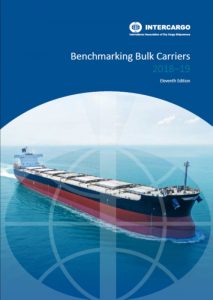The INTERCARGO “Benchmarking Bulk Carriers” 2018-19 report has been published.
Members may access it attached to this webpage (login required) and will be receiving their free copy. Non-members may order the report at info@intercargo.org or from Witherby Publishing Group (www.witherbys.com).

Foreword / Executive Summary
INTERCARGO’s 2018–2019 Benchmarking Report is published during a time of much uncertainty in the dry bulk market. The Baltic Dry Index had reached a high above 1,770 points in August 2018, before retreating down to 600 points in February 2019. It then rose to a peak above 2,500 points in September 2019, before tumbling down to just above 400 points in February 2020. Throughout this period the market has been subjected to international trade and geopolitical tensions, regional infrastructure disaster setbacks, uncertainty over the impact of the IMO 2020 sulphur regulation implementation, and slowing Chinese industrial activity. Most recently, the Coronavirus pandemic has had a dramatic impact on the world and created unprecedented disruptions, threatening to compromise global commerce and economic growth.
The above developments have been taking place in a broader context of great changes for the maritime industry and dry bulk cargo shipping. As we enter the 2020s, the impacts of environmental legislation and digital/technological evolution are beginning to be seen. Our Members, the dry bulk cargo shipowners, remain committed to operational efficiency and emissions’ reduction, for one thing by continuously improving the fuel consumption of their vessels, which is necessary on a day-to-day basis due to the nature of the dry bulk tramp sector.
The efficiency of international shipping is largely due to the scale and efficiency offered by bulk carriers. We take pride that our sector is probably the most environmentally sound method of transporting cargo. Under the International Maritime Organization’s regulatory umbrella, further environmental improvements to shipping are under way, such as new regulations for greenhouse gas emissions. However, fuel suppliers, fuel distributors, charterers, shipyards and engine suppliers must work together with us to find specific solutions for our sector.
Dry bulk carriers remain the workhorses of international shipping and global trade, serving the essential needs of humankind and necessary for maintaining the desired living standards in developed economies, and enabling less-developed countries to progress towards higher living standards. Main and minor dry bulks include cereals, grains, agricultural and forest products, as well as iron and other mineral ores, coal and fertilisers, and several other basic goods.
INTERCARGO’s three reference pillars remain those of safety, efficiency, and environmental soundness with a constant aim for “quality and operational excellence”. This benchmarking report refers to past year 2018, as, unfortunately, the process of collecting data from bulk carrier inspections is still subject to such considerable time delay. This is an issue we aim to hopefully resolve next year, in order to reduce delays and errors in identifying areas of concern.
An introductory section looks into the capacity of the global dry bulk fleet, the newbuilding orderbook and other key aspects of the global dry bulk fleet and market trends in the period under consideration.
With safety for crews and ships coming first, our sector was pleased to record no losses of ships; however losses of lives were reported from other incidents on board including those related to confined space entry and falls. Lessons learnt from past incidents play an important role in determining where additional safety improvement are necessary. We take a look at the incidents recorded in 2018 and the ten-year trends in the annual average number of lives and ships lost within the bulk carrier industry. For one more year, the latter offer us positive signs of safety improvement. Once again we reiterate the importance of investigating an incident and the subsequent casualty investigation reporting in a quality and timely manner.
Classification Societies provide valuable services for the design, construction and maintenance of ships, among other technical services, enhancing maritime safety and pollution prevention. IACS members continued to lead the way in terms of market share and quality, as per recorded data.
The number of Flags decreased from 85 in 2017 to 84 in 2018, while the number of leading flags increased from 12 to 14. The majority of the 14 leading flags improved their deficiencies record, and it is also encouraging to note that the majority had a positive metric for detentions as a function of market share.
In 2018, INTERCARGO-entered ships continued to significantly outperform industry averages in respect of both detentions and deficiencies per inspection. It remains a core requirement of INTERCARGO policy that vessels entered by Members should meet strict acceptance criteria, which is set significantly higher than industry averages.
The Owners’ benchmarking tables, in the relevant section, apply to the global dry cargo fleet and allow dry bulk companies to compare their fleet performance against their peers, including Detention rates and Deficiencies per Inspection ratio indices.
The Negative Performance Indicators section puts into perspective recorded incidents on board bulk carriers in 2018 (such as collisions, groundings, etc) by categorising them accordingly.
The International Group of P&I Clubs continued to dominate the market with an almost 84% share, and at the same time outperformed the non-IG P&I providers in terms of quality. However, the non-IG P&I Clubs increased their market share.
The section on Port State Control (PSC) provides an updated overview of the most important PSC regimes and looks into self-discipline measures and transparency, inspections and detention data for bulk carriers in 2018, ship targeting systems and performance indicators, measures to harmonise PSC activities and procedures worldwide, and Concentrated Inspection Campaigns.
Members and non-Members of our Association are encouraged to continue participating in INTERCARGO’s Reporting Schemes, including ‘Ship-Terminal Interface Experiences and Problems’ and ‘Safe Loading/Unloading at Anchorage’, as well as ‘Benchmarking crew injury frequency and lost time’.
Apart from the annual Benchmarking Report, other INTERCARGO publications include our Annual Review and the annual ‘Bulk Carrier Casualty Report’ (see page 44 of this report). Our Association’s activities (such as participation in Industry Working and Correspondence Groups, and of course at IMO) are related to specific items of our work programme, including Cargoes, Design & Construction, Machinery & Operations, Ballast Water, Emissions, Ports & Terminals, Life Saving, and the Human Element, to name a few.
INTERCARGO provides the forum where dry bulk shipowners, managers and operators are informed about, discuss and share concerns on key topics and regulatory challenges, especially in relation to safety, the environment and operational excellence. The Association takes forward its Members’ positions to the IMO, as well as to other shipping and international industry fora, having free and fair competition as a principle. INTERCARGO is committed to safety and quality in ship operations, with a focus on operational efficiency and the protection of the marine environment.
Thank you for supporting our mission.
The INTERCARGO Secretariat
February 2020


